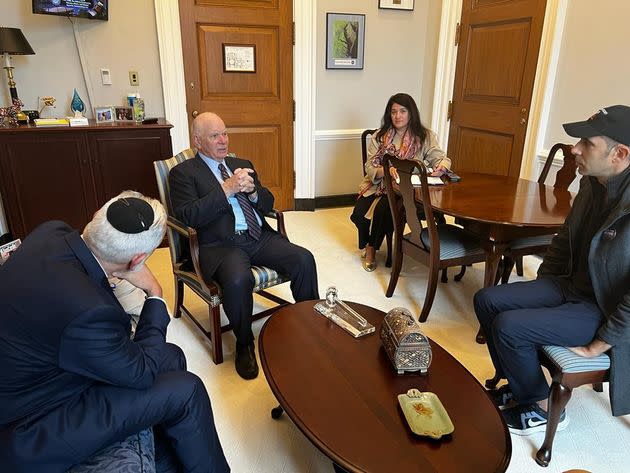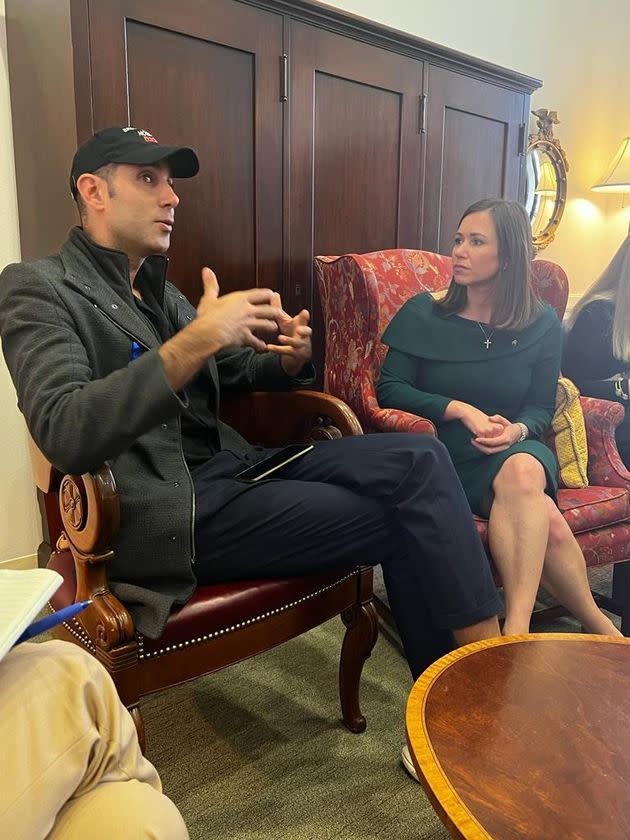Families of Hamas Hostages Urge U.S. To Use Its 'Highest Leverage' To Bring Captives Home
- Oops!Something went wrong.Please try again later.
WASHINGTON ― After Hamas released two older hostages last month, Abbey Onn got a sliver of information: Her cousin Ofer Kalderon, a 50-year-old whom Hamas had also kidnapped, was still alive when his two fellow captives were freed. Neta Heiman wasn’t as lucky ― the released hostages knew her mother, 84-year-old Ditza, but they hadn’t seen her while detained. Meanwhile, Gili Roman has heard no details about the fate of his kidnapped 36-year-old sister, Yarden, beyond what her husband recalls from the moment when she was snatched away from him and their 3-year-old daughter.
The families of the estimated 240 people kidnapped in a vicious Hamas-led offensive inside Israel on Oct. 7 are one month into an ordeal of separation, uncertainty and fear. Many of them are increasingly worried that efforts to bring home their loved ones will be overlooked amid the global debate over Israel’s reprisal against Hamas, a campaign against the Palestinian militant group’s bases in Gaza that has killed more than 10,000 people so far.
And they see one tactic as key to ensuring that doesn’t happen: winning international support for their cause, particularly in the U.S.
The U.S. “is the determinant factor,” Roman told HuffPost, going on to list the reasons why he traveled to Washington, D.C., and New York to highlight his family’s case for American officials and the general public.
“The U.S. has the highest leverage over the actors that can pressure Hamas,” Roman said, in a reference to regional players such as the American ally Qatar, which hosts Hamas’ political leader Ismail Haniyeh. Washington can impose “a price tag… consequences for different actors whether they deliver or don’t deliver.”
The U.S. is also heavily supporting Israel’s Gaza operation, he added, and so has influence over whether that offensive leads to military rescues of hostages, while the Biden administration’s choices about positioning U.S. forces in the Middle East and keeping a lid on regional tensions are focused on preventing a broader conflict.
Roman met with more than a dozen lawmakers on both sides of the aisle last week. This week, Democratic and Republican members of the House of Representatives held news conferences with relatives of other Hamas hostages. In Israel itself, family members of captives have repeatedly met with visiting members of Congress to request U.S. assistance. Only a handful of the hostages hold American citizenship, but relatives of the group say they see the U.S. as crucial in helping all of them. Of the four released so far, two were Israeli Americans.
On Wednesday, multiple news outlets reported that the U.S. and Qatar are working on a deal between Israel and Hamas to establish a dayslong pause in fighting that would involve the release of up to 15 hostages and more shipments of humanitarian aid into Gaza. CIA Director Bill Burns, a veteran diplomat, will visit the Qatari capital of Doha on Thursday.
Hamas has demanded a surge in supplies into the Gaza Strip and has spoken of a large-scale prisoner swap that would involve Palestinians detained by Israel.

Yarden Roman-Gat, captured by Hamas, has not seen her husband, 3-year-old child or other relatives for more than a month.
Many advocates for the hostages as well as officials involved in conversations about their fate say American involvement is vital because of questions about how heavily Israeli Prime Minister Benjamin Netanyahu is prioritizing their release relative to other goals, such as dealing a decisive blow to Hamas.
“Our administration is very focused on this, and I think they’ve been doing a really good job, including in their outreach to the families and their internal efforts to try and push other actors to play a helpful role. The Israelis have been more difficult: I think Netanyahu has written off the hostages,” a Senate aide told HuffPost, describing the Israeli leader as “unwilling to make any kind of concessions.” The aide requested anonymity to describe sensitive internal conversations.
Israel’s embassy in Washington did not respond to a request for comment for this story.
Israeli negotiators are dominating behind-the-scenes discussions about agreements that could free the captives, according to a U.S. official familiar with diplomacy around the issue. Last month, Israel launched its ground invasion of Gaza amid delicate negotiations mediated by Qatar, The New York Times reported. The escalation of hostilities quashed the discussions.
Netanyahu has repeatedly rejected American proposals for a “humanitarian pause” on the attacks on Gaza, saying Hamas must first release its hostages. His grip on power depends on his tenuous alliance with far-right politicians, some of whom have portrayed the return of the hostages as less important than avenging the Oct. 7 attack. On Sunday, Israeli Heritage Minister Amihai Eliyahu endorsed the idea of a nuclear attack on Gaza. When pressed on the consequences for kidnapped Israelis, he responded: “I pray and hope for their return, but there is a price to be paid in war.”
Netanyahu called Eliyahu’s comments “disconnected from reality” and suspended him from cabinet meetings, but the far-right politician remains in the government.
Rep. Jamie Raskin (D-Md.), one of several prominent U.S. lawmakers who has met with hostages’ family members, told HuffPost he wants to bolster efforts to ensure Israel prioritizes the captives, whose kidnapping he described as “a war crime.”
“I am with the thousands of Israeli protesters who gathered in central Tel Aviv on Saturday night calling for Netanyahu to focus first and foremost on the immediate return of the hostages,” Raskin said in a Wednesday statement, praising the Biden administration’s push for a halt in fighting.
‘The Most Horrible Man’
Saying it is past time for their family members to be brought home, some relatives of hostages contrasted Israeli officials’ approach with that of other global leaders.
Onn, a Massachusetts native, said Sen. Elizabeth Warren (D-Mass.) had personally reached out to her and that she’d had frequent interactions with French officials because part of her family is French. “We are on every side shocked ― that is what makes it a little bit more frustrating with the Israeli government,” Onn said.
Heiman blasted the Netanyahu administration’s public narrative, saying: “Every time someone [from the government] talks, he says, ‘First destroy Hamas, destroy Gaza,’ and maybe the third sentence he’ll say, ‘Bring them home.’ I don’t think it’s the first priority.”
She sees a negotiation with Hamas involving the U.S. and other governments like Egypt as essential, even though she sees the group’s Gaza chief Yahya Sinwar, whom Netanyahu freed in a previous prisoner swap, as “the most horrible man.”
“The United States and all the world need to do anything that they can to bring them back,” Heiman said. “It must be not in a military way because there is no possibility to bring 240 people in a military way without damage for them and for the soldiers that will do it.”
To Roman, Netanyahu’s formation of a special emergency cabinet to oversee the war along with some of his more moderate rivals is a positive sign. He feels Israel is now calibrating its military operation to ensure Hamas does not see the hostages as key to its battlefield strategy and to maintain the possibility of a pause that could allow the captives to be released. The Israel Defense Forces have called the hostages “our top priority.”

Gili Roman (far right) met with Sen. Ben Cardin (D-Md.), the chairman of the Senate Foreign Relations Committee, among other influential U.S. lawmakers last week.
Washington is focused on backroom talks and support for affected families. It sees freeing the detainees through military action as extremely unlikely, the U.S. official said. And it has a limited menu of alternative ways to encourage Hamas to free hostages, unlike other countries with affected citizens: The Senate aide noted that the Russian paramilitary organization Wagner Group is reportedly sending air defenses to Hezbollah, the Lebanon-based militia aligned with Hamas. The Palestinian group is thought to be holding at least eight Russian-Israelis, and Moscow has hosted a Hamas delegation, something the U.S. cannot do because it considers the group a terrorist organization.
To some in the Biden administration and in Congress, the best way to support America’s effort to rescue hostages is to reiterate the call for a limited halt in hostilities.
“It’s going to be very difficult to get hostages out if a campaign is actively ongoing. In order to get hostages out and get humanitarian aid in, we think some type of pause would be really helpful and very likely necessary,” said an aide to a senator who has met with hostage families. The aide requested anonymity to speak of sensitive internal discussions.
American legislators are also helping by highlighting the hostage issue in the numerous bills and statements that they are advancing related to the Israel-Hamas war, Onn said. She sees continued interactions with the captives’ relatives as essential to maintaining that support.
“People need to hear firsthand testimony, they need to feel the pain in order to go back and do the work,” said Onn, who has met with multiple U.S. lawmakers who have visited Israel over the last month. “Sen. [Lindsey] Graham [R-S.C.] said, ‘I don’t sleep any more.’ Good ― neither do we.”
‘We’re Still Taking Rockets Every Day’
As families hope for their loved ones to return, they are leaning on each other.
Onn described daily check-ins with other relatives of hostages and directing them to opportunities to speak at public events or with journalists. “Every single time this story gets out, it helps all of us,” she said.
Roman, who also holds German citizenship, has also traveled to Berlin to urge officials to help free his sister, saying he is trusting other families “to raise awareness inside Israel.”
All the while, most families have yet to receive any proof of life regarding their kidnapped relatives ― and they are contending with the knowledge that they are in an active war zone. Hamas has claimed that Israeli airstrikes have killed dozens of the captives.
“We are worried,” Roman said. “I don’t know how to divide my worries between what Hamas might do to her … maybe take her outside of Gaza to Iran. The list of worries we have is endless.”

Gili Roman (left) met with Sen. Katie Britt (R-Ala.), among other legislators.
Onn said she tries not to think too much about what her three kidnapped relatives are going through.
“Every single person in Israel knows someone with an awful story. If you actually feel them, you’ll stop moving,” she said. “We have to just put them aside for the moment. There will be a day after when the whole country goes to therapy.”
She noted how other aspects of the war make any normalcy impossible: “We’re still taking rockets every day. Our children are not in school ― they’re asking if Hamas is coming for them also.”
Thirty-one days after her mother was taken, Heiman is still making the same plea: that she get her essential medications.
She told HuffPost she wants the Red Cross, which has facilitated the hostage releases that have taken place so far, to try to ensure that at least.
“There is no time for the old people… we need to bring them home now,” she said.
